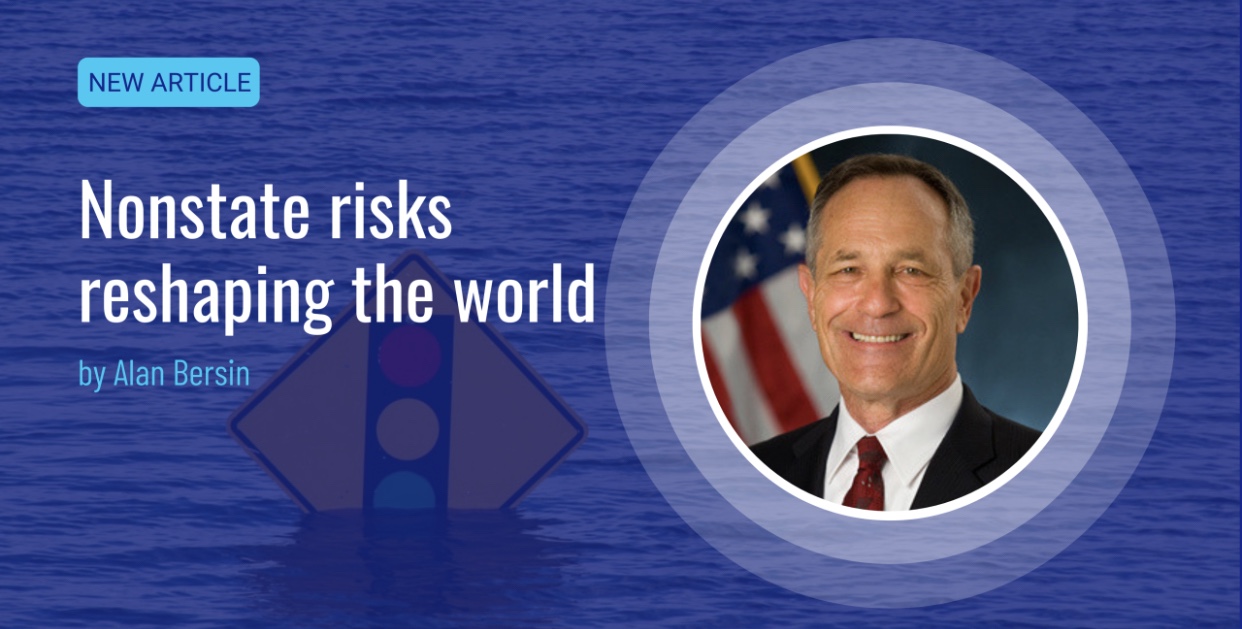Nonstate risks reshaping the world
My colleague and dear friend, Dr. Alan Bersin, has written an excellent article on how mondtate risks are reshaping the world. Read it here below.

In just the last weeks, we have seen catastrophic wildfires, major hurricanes, cyber threats to core civic processes, and heightened domestic terrorism threats—all in the midst of the ongoing COVID-19 pandemic. This confluence of events highlights the prominent role that nonstate threats are playing in shaping the world, the business and finance markets, and our personal lives. These threats have proven themselves time and again to be real and consequential. Yet, the public and private sectors keep being caught unprepared. It is time to break this pernicious cycle by recognizing nonstate threats for the risks they pose, and planning and preparing so we can meet them head on.
Many of the most disruptive events of the last 20 years have had little to do with geopolitics. Instead, they arise from a basket of nonstate threats: terrorism, disease, international crime, cyber vulnerabilities, mass migrations, and the effects of climate change, in particular intensifying natural disasters. COVID-19 tragically proves the point, but consider these other examples:
The terrorist attacks of 9/11 reordered U.S. security policy, spending, and politics, followed by the threat of ISIS and a decade of deadly international terrorist violence;
Cyber crime (some of which includes state sponsorship) has become a clear and present danger to the regular operations of businesses, while government attempts to address vulnerabilities remain detached and inadequate;
Mass migration events are roiling politics and overwhelming processing systems in the United States and Europe, as displaced people from the developing world seek refuge—not in faraway camps, but by arriving at the border—as exemplified by the recent surges of Central American asylum seekers at the U.S. border;
Natural disasters are escalating: the United States recently saw drought and record heat cause unprecedented wildfires in California and Colorado, while a monster hurricane slammed the Gulf Coast;
Criminal syndicates are causing violence and instability on scales that was previously seen only by nation-states, including penetrating top levels of industry and government and rendering some countries quasi-failed states;
The opioid epidemic in America, fueled by the illicit trafficking of heroin and fentanyl, has claimed tens of thousands of lives, caused billions in economic impacts, and devastated communities across the country;
The world has seen a near disease disaster every few years since 2000—MERs, SARs, Ebola, H1N1, and Zika—with COVID-19 exploding this year.
The same forces that are revolutionizing society and business—the explosion of the internet and information-technology, the breakdown of national borders for trade and travel, modern supply chains and finance, among others—are simultaneously creating new vulnerabilities to these types of threats. These threats pose an unmistakable danger to the international networks that enable our way of life.
As nonstate actors become more capable, traditional geopolitical threats are also resurfacing in new forms, particularly through technologically enabled proxy organizations. Another threat will challenge us—we cannot stop that, but we can be better prepared to meet it and defeat it. I’ll be writing more about these threats and the steps that can be taken to recognize and mitigate them in the coming weeks.
I agree entirelywith Alan. It is indeed time for the world to start shaping a proper response to the globalization effects emerging in relation to a broader risk perspective. Is the pandemic the momentum for this?
Many of these risks are also interlinking and in Europe we have seen organized crime moving into new sectors during the Covid-19|Corona crises.
We need to make sure that the underworld of globalization that we have seen emerging over the last years does not become the only world exisiting.
We certainly need a new paradigm on risk management.
Dr. Alan Bersin is Chairman of New Macro Risks and Altana Trade, former Assistant Secretary and Chief Policy Officer Department of Homeland Security, former Commissioner U.S Customs and Border Protection, ex BorderTzar.
You must be logged in to post a comment.